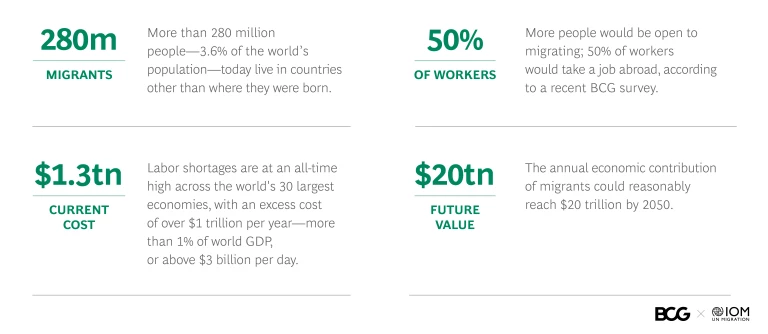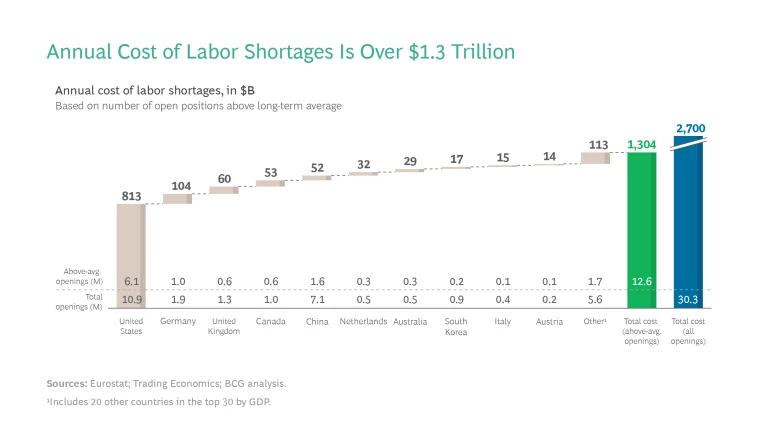This BCG report, developed in collaboration with the International Organization for Migration (IOM), offers winning strategies, actionable advice, and examples of best practices.

Affected by the ongoing pandemic, accelerating climate change, and geopolitical and economic destabilizers, millions of people have moved across borders since the start of 2022. While cross-border migration currently generates an annual economic output of around $9 trillion, this figure could more than double by 2050, to around $20 trillion a year, according to a report from BCG, in collaboration with the IOM.
The report outlines the economic case for migration and highlights more than 20 actions across three key strategies that companies can deploy to employ, elevate, and embrace migrants in the workplace.
Today, more than 280 million people—3.6% of the global population—live in countries other than where they were born.

In addition, in developed countries with aging populations, the political desire and fiscal necessity to keep dependency ratios stable could lead to even higher levels of migration.
Forward-thinking leaders will recognize that migration is more than a human cause. It is both a business and a societal opportunity that promotes economic welfare, innovation, and global competitiveness. — Janina Kugel, Senior Advisor
Migration is not only essential for future economic welfare but also presents a substantial opportunity. Business is currently suffering from unprecedented labor shortages across skill levels, especially in industries such as digital technology, health care, education, trade, and construction. According to a BCG study of 30 countries, above-average labor shortages today cost business more than $1 trillion a year. That’s over $3 billion a day—or more than 1% of global economic output.
Journal of Economic Growth, Springer, vol. 21(2), pages 101-138, June.

Even though the economic case is clear, business has yet to move. According to a recent BCG survey covering 850 executives in ten countries, 95% of private-sector leaders see the value of working with global talent, and 80% take some actions to capture that value; however, only 5% of them do so in a consistent manner that yields financial impact. To address this apparent gap between aspiration and action, this Brief shares more than 20 operational levers, illustrated with best practices from global corporations, which allow companies to benefit from migration and protect the rights of migrants. To do so, business can, and must, deploy three strategies to employ, elevate, and embrace migrants in the workplace and beyond:
1. Develop a global talent strategy. A common starting point is to employ foreign-born workers to staff hard-to-fill roles or cover short-term needs. Businesses can access fresh pools of talent by adopting new language norms, globalizing their hiring, using new recruitment platforms to discover overlooked talent, and allowing for more remote operations.
At GetYourGuide we’re hiring globally since day one. Now, it’s time for us all in Europe to fully embrace this potential—it’s not just the right thing to do but also the wise thing to keep our competitiveness and drive innovation. — Tao Tao, Co-Founder and Chief Operating Officer of GetYourGuide
2. Deploy a global innovation strategy. This strategy drives value by harnessing the cognitive variety of globally diverse teams that are often more creative when solving complex innovation challenges. Companies can adopt this strategy by creating migration networks within their organizations, setting up externship programs, and championing differences to spark creativity that, when supported by the right operational levers, will boost and elevate innovation.
3. Stand for global human rights. Migration needs corporate allies that will embrace and protect migrants’ rights before, during, and after migration while ensuring business practices are aligned with international labor standards. To improve policymaking, business leaders should participate in forums and share the benefits, opportunities, and challenges of global migration. They can lead by expressing their support for the principles outlined in the UN Global Compact for Safe, Orderly, and Regular Migration, and by partnering with governments and civil-society organizations to establish secure and dignified migration paths. Business engagement strengthens the governance structures that protect and safeguard the rights of migrants, and is vital to develop more sustainable and legal migration pathways.
Despite migrants’ undeniable contributions to global economies—according to BCG, cross-border migration currently generates an annual economic output of around $9 trillion—significant work still needs to be done to uphold migrant rights and capitalize on their full potential. Investing in safe, orderly, and dignified migration is not only the right thing to do but also the smart thing to do for the private sector. — Ugochi Daniels, IOM’s Deputy Director General, Operations
It still remains difficult and risky for people to move across borders, even though public sentiment on migration has turned somewhat more positive in recent years,
Companies that act today can gain a sizeable competitive advantage tomorrow. Those that have embraced globally mobile talent, not only in their workforces but also in their leadership, have seen greater profitability and faster innovation. A BCG analysis of more than 3,000 publicly listed companies shows that companies with greater global diversity generate 2.2 percentage-point higher profits (in terms of EBIT
Shifting demographics, the climate crisis, and geopolitics, among other factors, are accelerating the global movement of people, and they will continue to do so in the future. Fortunately, migration can not only help alleviate some of those challenges, it also represents an opportunity for business to thrive in the face of adversity. There are trillions of dollars, billions of lives, and countless innovations at stake. It is time for business leaders to put global migration on their strategic agenda and take a stand for migrant rights.
About IOM UN Migration
About IOM
IOM supports migrants across the world, developing effective responses to the shifting dynamics of migration and is a key source of advice on migration policy and practice. The organization works in emergency situations, developing the resilience of migrants in need, including refugees and internally displaced people, particularly those in situations of vulnerability, as well as building capacity within governments to manage all forms and impacts of human mobility.



